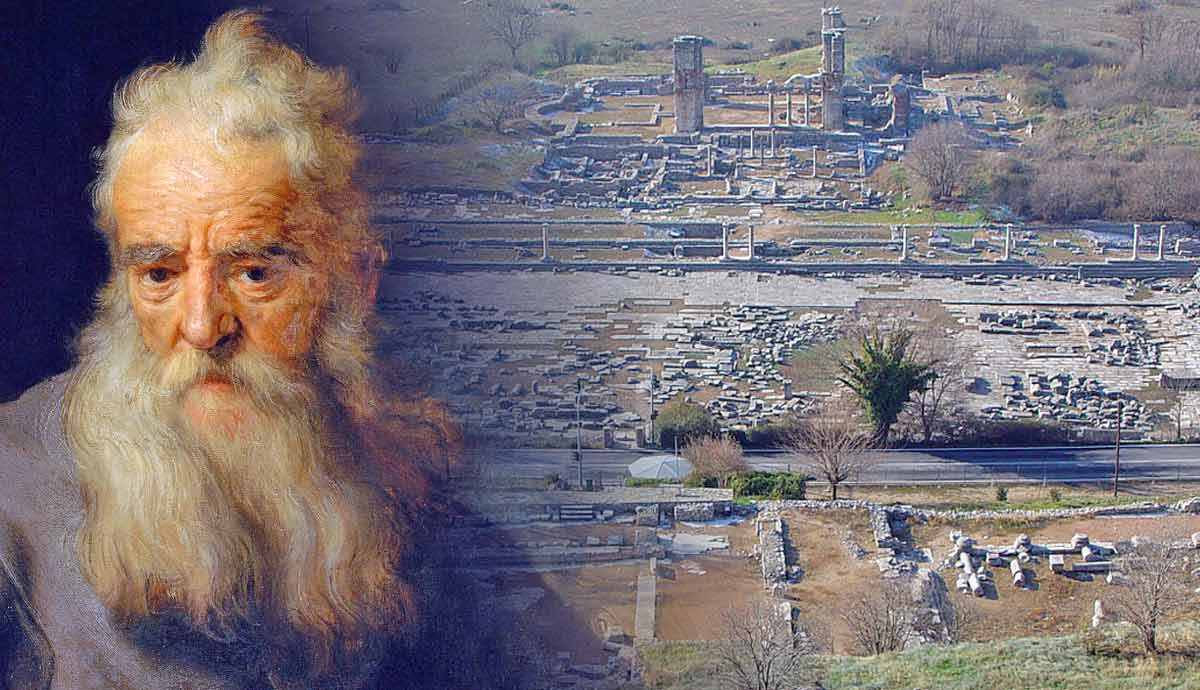
The letter by Paul to the Philippians is remarkably positive. Paul was in prison when he wrote it, yet he guides them to have a mindset that few in his situation would have. The motivation for his resilience, positivity, and gratitude becomes clear as he addresses a beloved church he established about a decade before he wrote the letter.
Authorship and Date

Scholars believe the Epistle to the Philippians is an authentic Pauline work, and he acknowledges Timothy as its co-sender. It seems to be a compilation of several fragments of communication that Paul had with the church he established there. As a possible compilation, it is hard to pinpoint a date. Paul was writing from prison but was imprisoned several times and he does not specify which imprisonment he is referring to.
Most scholars agree on the date of 60-62 CE when the Romans imprisoned Paul in Rome. This date is consistent with the Book of Acts and agrees with Paul’s life and ministry.
Historical Context

The Thracians established the town of Krenides in the 6th century BCE. The town’s name later changed to Philippi, after the father of Alexander the Great, Phillip II of Macedon, in 360 BCE. It eventually became a Roman colony under Octavian (Emperor Augustus). It had a Greek-Macedonian population and a small group of Jewish people also resided there.
Paul had established the Christian community in the city on a previous missionary journey. Acts 16 details several incidents that occurred during Paul’s visit and his imprisonment there with Silas. City leaders asked them to leave the city but Paul returned at least once when he was on his way to Jerusalem (Acts 20) and possibly on other occasions as well.
The Philippian church supported Paul in his ministry, and the letter indicates that Paul and the Philippians had much affinity for one another.
Structure

Salutation (Philippians 1:1-11)
Paul greets the Philippians in true Pauline style, blessing them with grace and peace. He offers a prayer and thanksgiving for them.
Paul’s Situation
Paul explains his imprisonment as beneficial for the advancement of the gospel. He mentions how some proclaim the gospel from envy, rivalry, and selfish ambition and contrasts that with those who do it from goodwill and love.
Christ’s Example
Paul shows how Jesus set an example for believers by selflessly giving himself for the sake of others. Similarly, the Philippians should understand that their suffering is in service of the gospel.
The Examples of Timothy and Epaphroditus
Paul notes the examples set by Timothy and Epaphroditus. The former sets the needs of the people of God before his own, selflessly serving them. The latter left his home and faced life-threatening situations to serve Paul’s needs.
Paul’s Example
Paul points to his own example, regarding everything that propelled him socially to a position of status as a loss and as nothing in comparison to knowing Christ better. It parallels what Christ has set aside and became for the salvation of man.
Challenge and Encouragement (Philippians 4:2-9)
Paul challenges two women, Euodia and Syntyche, to work together and set aside their differences. He encourages them to guard their minds by focusing on the positive and building things.
Greeting
Paul expresses his gratitude for the provision he received and greets the Philippians.
Main Themes

Joy and Rejoicing
Considering the circumstances under which Paul was writing, it is noteworthy that Paul has joy and rejoicing as a major theme in this letter. He expresses his joy, irrespective of his predicament, and sets an example for the Philippians to also “rejoice in the Lord always” (Philippians 4:4). To Paul, joy is not dependent on your immediate situation.
Humility and Unity
On several occasions in his letter, Paul calls for humility either in words or by example. Humility makes unity easier to achieve. Humility and unity are essential to grow a faith community.
Encouragement in Suffering
Paul, writing from a situation of suffering, encourages the Philippians who also suffer to persevere. Paul speaks to the fact that his suffering creates an opportunity to spread the gospel message. He also shows how suffering is something the believer has in common with Christ, who suffered for their salvation.
Gratitude and Generosity
The Philippians supported Paul’s ministry which shows their gratitude for what he did for them. Their generosity toward his ministry shows how they wished others to receive the gospel as well and speaks to the character of this Christian community.
Mindset
It is difficult for many to understand the mentality on display by Paul and the Philippians. To support others while suffering yourself is not natural. Paul points out how a mindset of service to others is central to being a Christian and was exemplified by Jesus himself who became a servant for the sake of others (Philippians 2:5-8).
Key Passages

Philippians 1:6
“And I am sure of this, that he who began a good work in you will bring it to completion on the day of Jesus Christ.”
This verse assures the believer that the process of spiritual growth is a continuous one. Wherever they are on their spiritual journey, it will be completed because God is part of the process. It may not be completed in this life, but the believer can be sure of a complete transformation in the second coming.
Philippians 1:21
“For to me to live is Christ, and to die is gain.”
Paul displays a win-win attitude based on his relationship with Christ. While he lives, he lives to glorify Christ and dedicates his life to his service. Should he die, he gains by being with Christ. The basis for Paul’s endurance in suffering and his joyful attitude is based on his firm belief in what he expresses in this verse.
Philippians 2:3-4
“Do nothing from selfish ambition or conceit, but in humility count others more significant than yourselves. Let each of you look not only to his interests but also to the interests of others.”
The attitude reflected in these verses can only come from a life truly changed by faith.
Philippians 3:7-9
“But whatever gain I had, I counted as loss for the sake of Christ. Indeed, I count everything as a loss because of the surpassing worth of knowing Christ Jesus my Lord. For his sake I have suffered the loss of all things and count them as rubbish, so that I may gain Christ and be found in him, not having a righteousness of my own that comes from the law, but that which comes through faith in Christ, the righteousness from God that depends on faith … ”

Paul alludes to the remarkable transition he underwent from a Pharisee to a Christ-centered believer. That which he held in high regard before he counted as rubbish after his conversion. It highlights the importance of personal knowledge of Christ in the life of the believer and the transformative power it holds.
Philippians 4:8
“Finally, brothers, whatever is true, whatever is honorable, whatever is just, whatever is pure, whatever is lovely, whatever is commendable, if there is any excellence, if there is anything worthy of praise, think about these things.”
Mindset is an important part of the message Paul relayed to the Philippians. Here he guides them in guarding their minds from negative things by encouraging them to focus on the positive.
Philippians 4:11-13
“Not that I am speaking of being in need, for I have learned in whatever situation I am to be content. I know how to be brought low, and I know how to abound. In any and every circumstance, I have learned the secret of facing plenty and hunger, abundance and need. I can do all things through him who strengthens me.”
Verse 13 is often used in a manner that Paul did not intend in his letter. He was not saying that he could do anything he wished to do. Contextually, he was saying that he can adapt to any circumstance for the sake of the gospel. He knows abundance and need and can thrive in either because God gives him the strength.
Contemporary Relevance

Contemporary Christianity can learn much from the Epistle to the Philippians. In the West, Christianity is not as persecuted as it was in Paul’s day. In other parts of the world, it is a different story. Paul’s call to endure while suffering is relevant to all persecuted Christians worldwide but may also speak to other kinds of suffering that believers endure.
The letter can guide the believer to find solace in whatever situation they face and it shows how a Christian is not dependent on circumstances to be happy and content. It helps readers to see how they can be generous and supportive of others even when they face struggles of their own. Looking forward and past the here and now can motivate the faithful in every era.
One of the most notable lessons the letter to the Philippians holds for today is on servant leadership. With examples set by Timothy, Epaphroditus, Paul, and Jesus, the merits of humility and serving others are evident. Much has been written on servant leadership in contemporary Christianity though in practice, it is still one of the most elusive attributes among prominent preachers once they gain notoriety.










